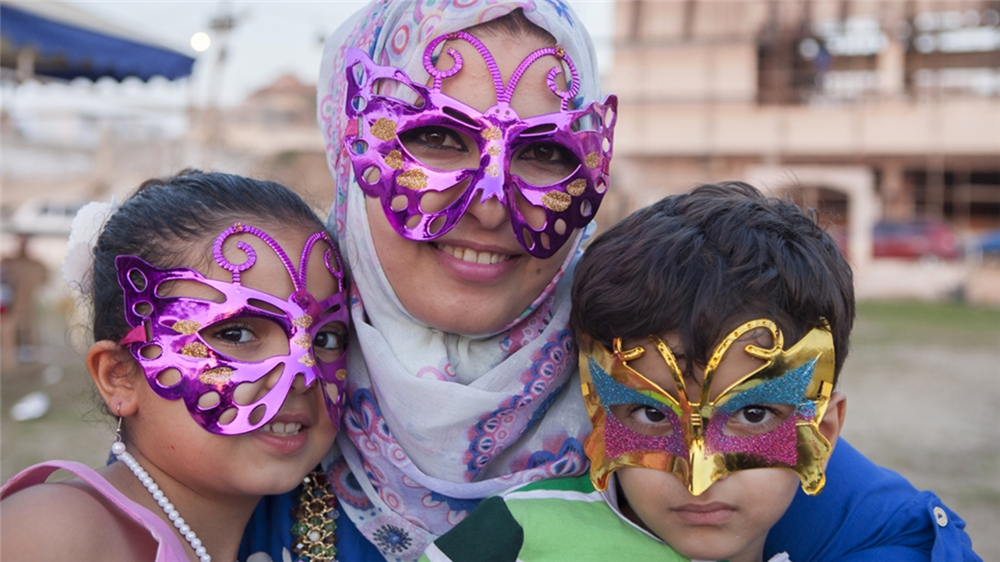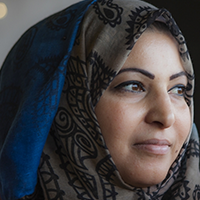كانت البداية مختلفة. فأنا فلسطينية ولدت في ليبيا عام 1983 حيث عاشت عائلتي في المنفى. فبعد تأسيس إسرائيل هجّر العديد من الفلسطينيين من أرضهم. وبلغ عدد من أجبروا على المغادرة بعد حرب 47/48 نحو المليون، ومئات الآلاف بعد حرب 1967. وبعد نزاع متواصل وانتفاضات شعبية، وافقت إسرائيل أخيراً على السماح لبعض الفلسطينيين بالعودة إلى أرضهم مقابل الاعتراف بدولة إسرائيل.
في عام 1993، نشأت السلطة الفلسطينية بموجب اتفاقيات أوسلو. ومع بلوغي الثالثة عشر، في مطلع العام 1996، أجريت أول انتخابات للمجلس التشريعي الفلسطيني. وفي العام نفسه، عادت عائلتي إلى فلسطين وحينها بدأ فصل مختلف كلياً من حياتي.
حين وصلت إلى غزة، لم أجد الحرية التي نعمت بها في الخارج. فآثار الاحتلال تسللت إلى جميع مناحي الحياة، وتركت سنواته الطويلة، إلى حد ما، أثراً سلبياً هائلاً على المجتمع الغزّي الذي كان أكثر انفتاحاً في فترة سابقة. لقد دمّر الاحتلال العسكري النسيج الاجتماعي.
كنت أحلم في طفولتي بأن أقود طائرة، وأسافر بحرية من بلد إلى آخر، ولكن كل ما تمنّيته وحلمت به تلاشى حين عدنا إلى غزة. فالمدينة كانت محاطة بإسرائيل من الأرض والبحر وحتى من الجو. أما على الصعيد الشخصي، اصطدم سلوكي بالتقاليد الاجتماعية. وببساطة لم يسمح للفتيات على ما يبدو بتحقيق طموحاتهن في ذلك الوقت. ولكنّي لم أقبل ذلك الواقع، وقد ولّد صراعاً شاقاً بيني وبين التقاليد السائدة.
في عام 2000، بدأت العمل مع "تلفزيون فلسطين" التابع للحكومة، كمقدّمة برنامج للأطفال. وكنت أكتب لصالح مجلّتين جامعيتين. وخلال جميع أنشطتي، حاولت أن أغيّر الطريقة التي ينظر فيها الناس إلى الفتيات والنساء، وأردت أن أقلّص القيود المفروضة علينا.
في الفترة اللاحقة وتحديداً بين عامي 2004 و2005، زارت غزة العديد من المؤسسات الدولية الداعمة للقضية الفلسطينية. وأمضيت معظم وقتي مع الممثلين عنها، محاولة فهم وجهة نظرهم تجاه بلادي وتجاه النزاع الفلسطيني الإسرائيلي. واكتشفت أن معظمهم لم يكن على اطلاع كاف بما يجري في منطقتنا. وأدركت بشكل خاص أنه كان من الضروري لفت نظر وسائل الإعلام الأجنبية إلى القصص التي لا يُسلّط عليها الضوء في غزة. وفي العام 2005، حين احتاجت صحفية ألمانية من "دير شبيغل" إلى منسقة محلية، لم أتردد في العمل معها. أتاحت هذه التجربة لي دخول عالم المراسلين الدوليين. ومنذ ذلك الوقت بدأت تطوير شبكة معارف، والتقيت العديد من الصحفيين الأجانب الآخرين، لأصبح أول منسقة صحفية في غزة.
تتّسم تغطية الحرب بالخطورة بكل المقاييس. كما أن إرسال الصحفيين الدوليين إلى مناطق حرب أو نزاع يعدّ انتحاراً إذا لم يكونوا عارفين بطبيعة المنطقة. وهذا يعني أن يعرفوا أموراً أساسية، مثلاً: كيف تدخل بلداً معيناً من الجو أو البر؟ ما هي أماكن الإقامة؟ بمن يمكن الوثوق؟ من سيعرّف عنك ويصلك بشخصيات رئيسية على الساحة السياسية؟ كيف ستتواصل مع الناس إن لم تكن تتحدث اللغة المحلية؟ هذه الأسئلة والكثير غيرها يمكن أن يجيب عنها زملاء صحفيون أو أصدقاء. غير أنه في معظم الحالات، لا يمكن إعداد التقارير الإخبارية التي ينشرها المراسل الأجنبي من منطقة تشهد حرباً مثل قطاع غزة دون الاستعانة بالمنسقين الصحفيين، أي أولئك الأشخاص الذين يسهلون عمل الصحفيين الذين يغطون أحداثاً في بلدان أجنبية. وقد يكونوا أحياناً صحفيين محليين أو مترجمين أو أشخاصاً لديهم شبكة معارف ويتمتعون بمعرفة جيدة بالمنطقة. بذلك يكون المنسق الصحفي عيون وآذان الصحفيين الأجانب الذين يعملون خارج نطاق خبرتهم. فيكون هؤلاء الأشخاص حلقة وصل بين الصحفيين والقصص التي يغطونها والناس والمعارف الذين يحتاجون إليهم لإجراء التغطية.
الحواجز الجندرية
ليس سهلاً أن يكون المرء منسقاً صحفياً في غزة، فكيف الحال إذا كان امرأة؟! فإضافة إلى المسؤولية الكبرى التي ينطوي عليها هذا العمل، يولّد وجود امرأة في هذا الموقع الكثير من الأحكام المسبقة. وفي الواقع، لم يكن الناس يستسيغون العمل مع الأجانب سيما وأنّ الناس في تلك الفترة كانوا يعتقدون بأنهم يخدمون مصالح إسرائيل. ولم يتوقف الأمر عند ذلك، فعملي معهم حتى ساعة متأخرة من الليل مستنكر ثقافياً كوني امرأة. وبالفعل حاول معظم أقاربي إقناع والدي بإيقافي عن العمل. غير أن والدي فاجأهم بردة فعله إذ كان دائم التشجيع والدعم، وكان أحياناً يرافقني خلال ساعات العمل الليلية أو يطلب من شقيقي ذلك. الصحافة هي مهنة الرجال في مجتمعي، كما أن بعض الناس في غزة لا يصدقون أننا نحن النساء قادرات على العمل في هذا المجال. وبالفعل عرّضني العمل مع صحفيين رجال للمضايقات ولكنّي أثبتّ مع الوقت مجدداً أنني قادرة على النجاح حتى في الأوقات التي لم ينجحوا هم فيها. وغالباً ما يغطي التمييز ضد المرأة حتى الآن على الجدارة والقدرات التي تتمتّع بها.
غير أن العمل كمنسّقة صحفية لا يخلو من الفوائد في البيئة التي أعمل فيها. فالنساء يستطعن الدخول إلى بعض الأماكن والوصول إلى بعض الأشخاص بشكل أفضل من الرجال. على سبيل المثال، من السهل عليّ الوصول إلى العائلات وجعل النساء والأطفال يفتحون قلوبهم لي. وهذا يتطلب تعاطفاً ورغبة صادقة في الإصغاء، ولكن لو كنت رجلاً، مهما بلغت من التفهّم والإنسانية، لن يقبل بعض الناس التحدث إليّ كما لو كنت امرأة.
لحسن حظي أيضاً أن زوجي يدعمني كثيراً ويساندني في جميع الأوقات حتى لو تعرّض أحياناً للانتقاد من المجتمع لكونه متزوجاً منّي ويسمح لي بالعمل كمنسّقة صحفية. فالمجتمع الغزّي المحافظ، يعتبر أن عائلتنا تكسر القوالب الاجتماعية لأن الرجل (زوجي) هو الذي يمكث في المنزل ويرعى الأطفال أثناء تغطيتي الحرب والنزاع. إنه سندي، ودائماً أزوّده بمعلومات الاتصال بالوسيط بيني وبين القصة الصحفية للتواصل معه في حال لم أتّصل أنا كل ساعتين وفقاً لاتفاقنا، ولكي يتحقق إن أصابني أي مكروه. في الواقع، يكمن الجزء الأصعب من عملي في ترك زوجي في المنزل مع الأطفال أثناء تغطيتي قصص الحرب.
العمل في ظل الحرب والاحتلال: خطر مضاعف ودائم
كفلسطينية تعيش تحت الاحتلال، أتعاطف أوّلاً وأخيراً مع عائلتي، وكمنسّقة صحفية لديّ مسؤولية تجاه بلدي وشعبي. هذا يعني أنني لن أوافق دائماً على العمل على قصص حساسة من شأنها الإساءة إلى سمعة شعبي. كما عليّ أن أحمي مصادري أثناء عملي على قصة صحفية، فحين يكون نطاق عملك ضمن منطقة نزاع، يمكن أن تتعرض مصادرك للقتل إذا تحدثت. لذلك أحاول جاهدة عدم المخاطرة بحياة أي شخص من أجل قصة صحفية، ويجب أن أكون حذرة تجاه الأشخاص الذين أعمل معهم. على سبيل المثال، عليّ أن أحذر من الصحفيين الإسرائيليين الذين ينتحلون صفة صحفيين غربيين. فغالباً ما يرغب الناس الذين يعارضون حقوق الشعب الفلسطيني، بإلصاق صورة سيئة بنا على الصعيد الدولي. وهؤلاء يريدون تصويرنا على أننا إرهابيون، وأن غزة مصدر الشر والرجعية. لذلك لن أسمح لنفسي بأن أكون أداة في يد صحفيين لديهم مآرب سياسية واضحة. في الوقت نفسه لا أستطيع أن أخفي بالطبع بعض الحقائق السلبية في هذا المجتمع. السياق أساسي ولكنّك كمنسّق ليس لديك سلطة تحريرية أو رقابة على ما ينشر لذلك يجب أن تختار بعناية الأشخاص الذين تعمل معهم والقصص التي تغطيها.
من الأساسي أيضاً أن أوثّق كل ما يحصل وأن ألتزم الصدق والحياد. وإحدى الطرق لبناء مقاربة محايدة والمحافظة عليها، هو عدم الانحياز وقراءة ما بين السطور أثناء نقل معلومات من تقارير إخبارية لأن كل قناة تلفزيونية محلية وكل صحيفة وكل إذاعة لديها وجهة نظر مختلفة، وغالباً ما يكون لديها أجندة مختلفة أيضاً.
غطّيت كل الحروب الإسرائيلية على غزة وكل الهجمات واسعة النطاق التي شنّتها إسرائيل على القطاع. لم يكن ذلك بالأمر السهل، إذ نجوت من غارات جوية واغتيالات موجّهة وتفجيرات سقط فيها آلاف الضحايا. لذلك أعتبر نفسي محظوظة ولكنّ ذلك يأخذني إلى نقطة أخرى بالغة الأهمية ألا وهي الحماية.
يعد غياب الحماية، وهو الخطر الدائم المحدق بالصحفيين المحليين في بيئات النزاع، جزءاً صعب من عملي، فمعظم المجموعات التي أعمل معها تأتي إلى غزة في مهمة قصيرة في حين أعيش هنا طوال الوقت. في الواقع لا يغيب الخطر عن حياتي وحياة زملائي أبداً. ونحن لا نستطيع العودة إلى بلادنا مثلاً واتخاذ ملاذ آمن والاسترخاء لأن غزة هي بلادنا. ولم يكن لدينا حتى أي عدة حماية أساسية كدرع للجسد أو خوذة للرأس خلال الاجتياحات الاسرائيلية للقطاع.
بالإضافة إلى ذلك، فإن العمل كمنسّق صحفي مع مراسلين دوليين، يزيد من الصعوبات. ففي غزة، لا يمكن للمراسل الأجنبي ببساطة أن يذهب بعيداً في أي قصة صحفية من دون منسق صحفي. وتفرض السلطات أن يكون لديك منسّق محلي لديه موافقة ليقوم بمساعدتك وتحمل مسؤولية الاهتمام بك. وغالباً ما يتحمّل المنسّق المسؤولية عن عمل الصحفيين الزائرين الذين غالباً ما يوظفونه لفترات قصيرة، ما قد يرتب عليه تداعيات عظيمة إذا سارت الأمور بشكل خاطئ.
يستهدف القصف معظم مناطق غزة سواء كانت عسكرية أو مدنية. وذلك يعني أنه خلال الهجوم، يستهدف العنف معظم القطاع على مساحة 360 كيلومتر مربع ويؤثر على عدد كبير من سكانه البالغ عددهم 1.7 مليون. لذلك فإن محاولة التوفيق بين كل ما يجري بشكل متزامن أثناء حماية الصحفيين الذين ترشدهم وتوجههم، تتطلّب الكثير من الجهد وتعرّضك كمنسّق للكثير من الإجهاد.
من الضروري أيضاً أن يعرف المنسّق الميداني جيداً وأن يحدد دائماً موقع الدخول والخروج في أي مكان يستهدفه القصف أو أي منطقة يغطّي فيها حدثاً ما. فإذا شعرت أن المنطقة خطرة جداً بما لا يسمح للصحفي الأجنبي بمرافقتي، أشرح الوضع له وأتركه يقرر. فإذا قرر الانضمام إليّ لا أفكّر أبداً بالمخاطرة التي يقوم أو نقوم بها وإلاّ أضع نفسي ومن معي في خطر، لأني سأصاب بالهلع ولا أعود قادرة على التفكير الصحيح أو التصرّف في الوقت المناسب.
ثمة اعتبار آخر يجب التنبّه إليه وهو بناء شبكة صلبة من المعارف المحليين. فهذا شرط أساسي لتكون منسقّاً ناجحاً. وهذا أمر مهم من أجل تطوير علاقة حقيقية وإنسانية وصادقة مع الناس تتجاوز أهدافك الصحفية، وتشجعهم على أن يفتحوا لك قلوبهم ويخبروك قصصهم. فهذه الفرصة التي يتيحونها لك ستعطيك معلومات لا تتوفر لأي كان. ولكن بالطبع هذا الأمر لا يخلو من المسؤولية؛ فهؤلاء بشر مثلي، وليسوا ضحايا ولا مآسي أو أرقاماً، ونحن جميعاً فلسطينيون نعيش في غزة. ثانياً، وجود هذه الشبكة من المعارف هو بمثابة دعم احتياطي. فإذا واجهت مشكلة في أي مكان، يمكنني أن أجد شخصاً ألجأ إليه ليساعدني ويكون أهلاً للثقة. وغني عن القول إنه يجب أن تحرص دائماً ألّا تعرّض أياً من هؤلاء للخطر.
من مهامي كمنسّقة أيضاً، أن أعمل على زيادة الوعي لدي المراسلين بالمخاطر التي تنطوي عليها تغطية بعض القصص. فعليّ أن أدق ناقوس الخطر إذا دخلنا في مواضيع أو جوانب قد تغضب من يتولّون السلطة في غزة. ففي النهاية، يقضي عملي بتقليص المخاطر التي قد يتعرض لها الصحفي الأجنبي في أرض أجنبية، ويقع جزء كبير من المسؤولية على عاتقي كمنسّقة صحفية.
الدوافع
في مقابل كل ذلك، ثمة ما يبدد كل الصعوبات التي تواجهني كامرأة صحفية ومنسقة صحفية في غزة وهو أنّني أستطيع إخبار العالم بشأن ما يحصل هنا، وما الذي نعيشه وما الذي يعبّر عنّا بشكل أفضل وما الذي نعاني منه بشدة.
بنيت ولا أزال شبكة كبيرة مع المجتمع المدني ومع مختلف الفصائل الفلسطينية، وهو ما سمح لي بتكوين صورة شاملة وثاقبة عمّا يحصل في مدينتي ولشعبي. ورغم أن الأصعب في عملي هو مشاهدة معاناة الناس إلاّ أنّ عليّ أن أخبر قصصهم. فهذا التزامي تجاه نفسي وتجاه مجتمعي. القصص التي أسمعها والصور التي أراها بأم عيني حقيقية ولا يمكنني نسيانها. وما زلت أتذكر تفاصيل كل قصة تركت أثراً عميقاً في نفسي. وأنا حتى اليوم لا أستطيع العثور على الكلمات المناسبة لوصفها.
يعرقل الحصار الإسرائيلي المفروض على قطاع غزة جميع نواحي الحياة هنا، تاركاً أثراً وخيماً على الاقتصاد والثقافة وحرية التنقّل وعلى الناس أنفسهم. والضائقة الاقتصادية هي دافع أساسي لكثيرين للعمل في هذا المجال رغم المخاطرة اليومية التي يعرضون أنفسهم لها. وبالفعل يعمل كثيرون اليوم كمنسّقين صحفيين، ولكننا كل يوم نعيش يوماً جديداً آملين بأن تتحسّن الأمور.
في الختام لا بدّ من القول إنه بالرغم من تلف معظم أرشيفي بسبب الحروب، فلي ذكريات حزينة وسعيدة في كل زاوية في غزة ولا يوجد مكان واحد لا يذكرني بعائلات وأشخاص التقيت بهم.

* المقال السابق هو فصل من كتاب "الصحافة في زمن الحرب" الصادر عن معهد الجزيرة للإعلام. لقراءة الكتاب كاملا، اضغط/ي هنا:
النسخة الإنجليزية، من هنا:








































